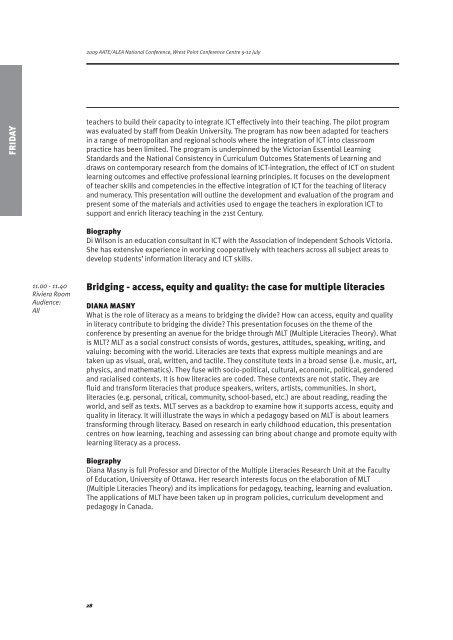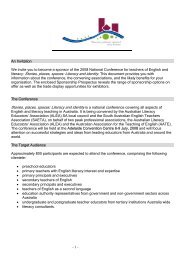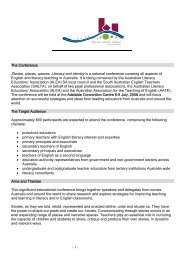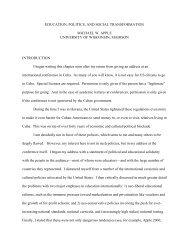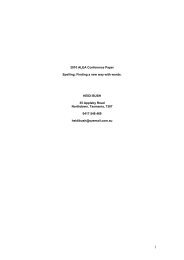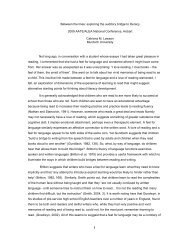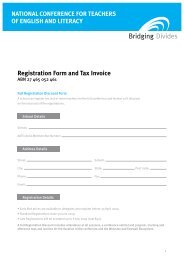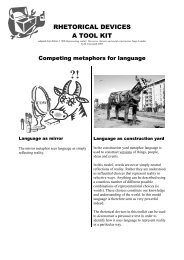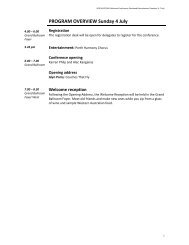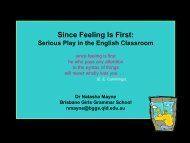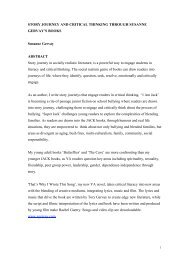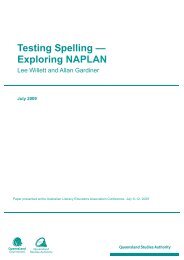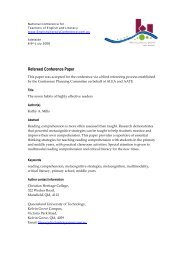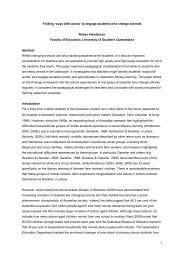Download - AATE/ALEA National conference
Download - AATE/ALEA National conference
Download - AATE/ALEA National conference
Create successful ePaper yourself
Turn your PDF publications into a flip-book with our unique Google optimized e-Paper software.
2009 <strong>AATE</strong>/ <strong>ALEA</strong> <strong>National</strong> Conference, Wrest Point Conference Centre 9-12 July<br />
FRIDAY<br />
teachers to build their capacity to integrate ICT effectively into their teaching. The pilot program<br />
was evaluated by staff from Deakin University. The program has now been adapted for teachers<br />
in a range of metropolitan and regional schools where the integration of ICT into classroom<br />
practice has been limited. The program is underpinned by the Victorian Essential Learning<br />
Standards and the <strong>National</strong> Consistency in Curriculum Outcomes Statements of Learning and<br />
draws on contemporary research from the domains of ICT-integration, the effect of ICT on student<br />
learning outcomes and effective professional learning principles. It focuses on the development<br />
of teacher skills and competencies in the effective integration of ICT for the teaching of literacy<br />
and numeracy. This presentation will outline the development and evaluation of the program and<br />
present some of the materials and activities used to engage the teachers in exploration ICT to<br />
support and enrich literacy teaching in the 21st Century.<br />
Biography<br />
Di Wilson is an education consultant in ICT with the Association of Independent Schools Victoria.<br />
She has extensive experience in working cooperatively with teachers across all subject areas to<br />
develop students’ information literacy and ICT skills.<br />
11.00 - 11.40<br />
Riviera Room<br />
Audience:<br />
All<br />
Bridging - access, equity and quality: the case for multiple literacies<br />
DIANA MASNY<br />
What is the role of literacy as a means to bridging the divide How can access, equity and quality<br />
in literacy contribute to bridging the divide This presentation focuses on the theme of the<br />
<strong>conference</strong> by presenting an avenue for the bridge through MLT (Multiple Literacies Theory). What<br />
is MLT MLT as a social construct consists of words, gestures, attitudes, speaking, writing, and<br />
valuing: becoming with the world. Literacies are texts that express multiple meanings and are<br />
taken up as visual, oral, written, and tactile. They constitute texts in a broad sense (i.e. music, art,<br />
physics, and mathematics). They fuse with socio-political, cultural, economic, political, gendered<br />
and racialised contexts. It is how literacies are coded. These contexts are not static. They are<br />
fluid and transform literacies that produce speakers, writers, artists, communities. In short,<br />
literacies (e.g. personal, critical, community, school-based, etc.) are about reading, reading the<br />
world, and self as texts. MLT serves as a backdrop to examine how it supports access, equity and<br />
quality in literacy. It will illustrate the ways in which a pedagogy based on MLT is about learners<br />
transforming through literacy. Based on research in early childhood education, this presentation<br />
centres on how learning, teaching and assessing can bring about change and promote equity with<br />
learning literacy as a process.<br />
Biography<br />
Diana Masny is full Professor and Director of the Multiple Literacies Research Unit at the Faculty<br />
of Education, University of Ottawa. Her research interests focus on the elaboration of MLT<br />
(Multiple Literacies Theory) and its implications for pedagogy, teaching, learning and evaluation.<br />
The applications of MLT have been taken up in program policies, curriculum development and<br />
pedagogy in Canada.<br />
28


